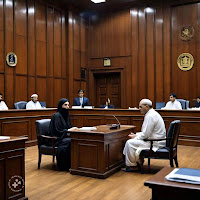Understanding Khula procedure in Pakistan: A Comprehensive Guide for Women
In Pakistan, the Khulah, Talaq or divorce can be pursued through various legal ways, with Khula being a significant right granted to women. Understanding the differences between Khula and divorce, along with the step-by-step procedure of filing for Khula, is essential for women who seek to exercise this right. This article aims to clarify these concepts and provide a comprehensive guide to the Khula procedure in Pakistan.
Khula vs. Divorce: What’s the Difference?
The primary distinction between divorce/Talaq and Khula lies in who initiates the separation and the nature of the process:
- Divorce (Talaq): This is a unilateral right exercised by the husband, allowing him to terminate the marriage at his discretion without needing court intervention. Their are other Islamic principles governing Talaq or Divorce.
- Khula: In contrast, Khula is a right exercised by the wife, allowing her to seek dissolution of the marriage. This process typically involves the wife requesting her husband to grant her divorce, often in exchange for financial compensation or the return of her dowry. What If Husband is not willing to give divorce willingly?. If Husband refused to give Divorce, Women have every right to get Khulah through court with out her husband’s consent.
The Khula Procedure in Pakistan: A Step-by-Step Guide
If you are considering filing for Khula, it’s important to follow a structured procedure. Here’s a step-by-step guide to help you navigate the process:
- Consult with Lawyer: Engage a lawyer who specializes in family law to assist you throughout the Khula procedure in Pakistan.
- Discuss Your Case: Share all relevant details of your situation with your lawyer to ensure they fully understand your case.
- Prepare the Case Outline: Your lawyer will draft an outline based on the specific facts of your situation, which will serve as the basis for your application.
- File the Khula Application: Your lawyer will file the Khula application in the Family Court, initiating the legal process.
- Notice to the Husband: The court will issue a notice to your husband, requiring him to appear and respond to the application.
- Court Appearance: If the husband appears, he will provide a written response, and the court will set a date for a reconciliation attempt. If he does not appear, the case can proceed in his absence.
Court Procedure For Khula in Pakistan
- Reconciliation Attempts: The court encourages both parties to attempt reconciliation. If both agree, the case may be resolved at this stage.
- Hearing Evidence: If reconciliation fails, the court will proceed to hear evidence from both sides. Your lawyer will present facts and arguments to support your case for Khula.
- Court Decision: After reviewing the evidence and arguments, the court will decide whether to grant Khula. If wife is does not agree to reconcile with her husband, court pronounce khulah degree in favor of wife.
- If Husband does not Appear: If the husband fails to appear despite being notified, the court may order a publication notice in a newspaper, followed by ex parte proceedings. and than decree of khula.
When Can a Woman File for Khula?
A woman may file for Khula under several circumstances, including:
- Abandonment by her husband for four years.
- The husband’s inability to provide financial support for two years.
- The husband’s polygamy without the wife’s consent.
- The husband’s imprisonment for more than seven years.
- Serious physical or mental abuse by the husband.
- Marriage conducted before the legal age.
- The husband’s serious illness or mental incapacity.
Sample of Khula application
Conclusion
Khula provides a crucial legal recourse for women seeking to dissolve their marriages in Pakistan. By understanding the differences between Khula and divorce, as well as the step-by-step procedure for filing for Khula, women can empower themselves to make informed decisions about their marital status. Consulting with an experienced family lawyer can significantly enhance the chances of a successful outcome, ensuring that all legal rights are protected.
Frequently Asked Questions (FAQs)
1. Will the woman seeking Khula have to return the dowry?
- Yes, a woman is generally required to return the dowry and any other property received from her husband when seeking Khula.
2. Does Khula only occur through court?
- While Khula can theoretically be negotiated outside of court, it is advisable to formalize the process through legal channels to avoid future complications.
3. What if the husband refuses to grant Khula?
- If the husband refuses to grant Khula despite valid reasons, the wife can take her case to a judge, who will evaluate the situation and determine the appropriate course of action.

